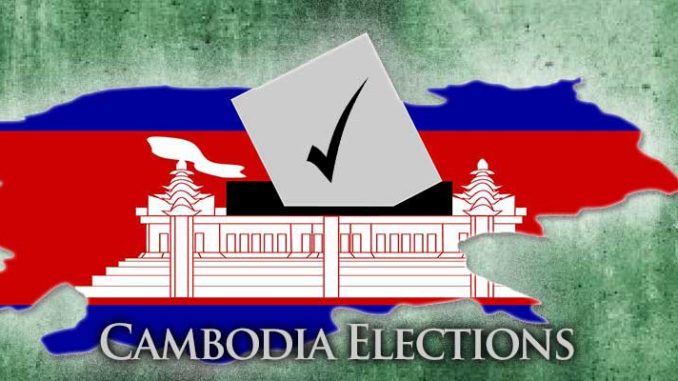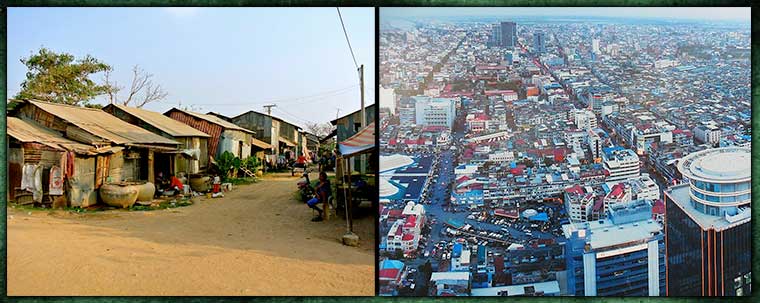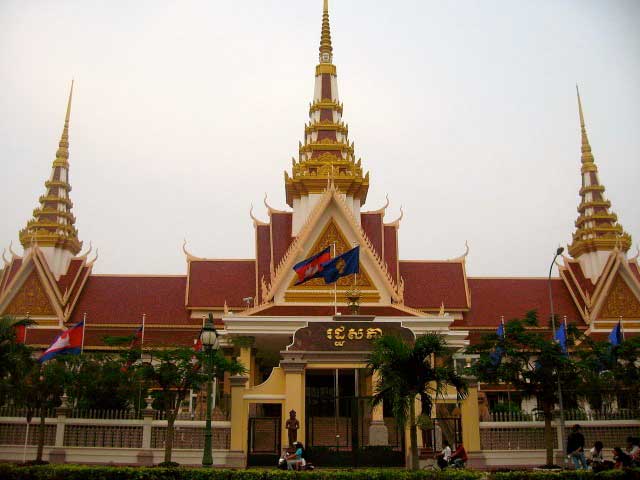
The results of the 5th General Election in Cambodia, which took place 28 July, 2013, came as a surprise to many casual observers. Few expected that the opposition Cambodia National Rescue Party (CNRP) would challenge the long-dominant role of the ruling Cambodian People’s Party (CPP) whose stroll to victory was assumed to be cut and dried.
When the National Election Committee declared the official result, the numbers showed a marginal victory for the CPP, winning 68 of the 123 seats in the National Assembly (NA). However, the opposition CNRP disputes the count. It claims to be the victors having taken, according to their numbers, 63 seats and should form a government with their majority of three. The controversy surrounding the results have paralyzed the establishment of the new government and led to mass protests on 15 September 2013 resulting in one death and several injuries. If we put the present squabbles aside and look back to the previous election in 2008, it was a very different story. The CPP took 90 out of the 123 National Assembly seats that were up for grabs. It is clear then that there has been a big shift in voter sentiment in the past five years.
Backward not forward looking
The primary reasons for the CPP setback might have been its outdated policies and a lackluster election campaign that harked back to the party’s achievements since 1979 when the Khmer Rouge regime was toppled. At the hustings, CPP campaigners had a simple message; national reconciliation, peace and stability, and steady economic development have been the key achievements of the CPP. But these ‘achievements’ rang hollow in the ears of the voters. Economically, Cambodia has performed well over recent decades with an annual average GDP growth of around 7 percent. Peace and stability has been maintained and the role of Cambodia on the international stage, especially through the participation in the UN Peacekeeping Operations mission, has been improved. Yet for voters these attainments have less meaning. For them, there is much more to be done and the list is long.
Cambodia is faced with chronic structural issues including a widening income gap, social injustice, a culture of impunity, widespread nepotism and corruption, rampant land grabbing and deforestation; and all these have rocked the legitimacy and loosening the CCP’s grip over popular support. There are other emerging socio-economic issues keenly felt by voters. These include low wages for factory workers and public servants, high inflation, fluctuations of the prices of agricultural products, high interest rates, and the increasing flow of Vietnamese migrants into the country. It is not surprising that with such a long list, the CPP offers a large target for the opposition.

While the ruling CPP crowed about its achievements —political and macro economic successes— the opposition CNRP focused on the shortcomings of the ruling CPP, a party that had governed the country for over three decades. Meanwhile the CNRP’s macroeconomic policies seemed to aim at enhancing the livelihood of the people, issues that connected with voters. It is not surprising that when polling day came, voters were starting to question whether the CPP was still up to the job.
The opposition Cambodia National Rescue Party (CNRP), a July 2012merging of the Sam Rainsy Party and the Human Rights Party hit out plain-speaking language. Clearly popularist, their political manifesto hinged on the root causes that impact voters’ welfare and livelihoods. They promised to increase the minimum monthly wage of factory workers from the current 80 to 150 US dollars. The salary of public servants would also be boosted to a monthly 250 US dollars. The elderly, those over sixty, were also promised a monthly allowance of 10 US dollars. Other economic policies put forward were reducing interest rates in order to serve the interests of small and medium enterprises and the poor. Moreover, the opposition party promised to fight corruption head-on, things like land grabbing and forced eviction, illegal logging and deforestation, illegal migration from Vietnam, and to top it all, to protect territorial sovereignty, in this case, referring to the border issues with Vietnam. All in, it was an attractive package for voters.
The Poll: Irregularities and suspicions … cries of foul
As polling day approached it became clear there were serious irregularities with voter lists. It was found that around 1.2 million eligible voters’ names were not included. The opposition party, the United Nations, and other international and local civil society groups requested the National Election Committee (NEC) to review and address the issue. However, the NEC was reluctant to act and did not take the case seriously. On polling day, many people could not find their names on the voter lists and there were several suspicious cases of duplicated names.
There were hints of electoral shenanigans even before the official announcement of the preliminary results by the NEC when Khieu Khanharith, a senior member of the CPP, claimed that his party had won 68 seats. The opposition CNRP cried foul and urged an investigation into polling irregularities. Some days later the CNRP claimed its victory with 63 seats based on its own reports of vote counts from polling stations. It was soon clear that the poll results would be open to dispute from all quarters.
The 2013 election: the same and different
Political crises and post-election deadlock is not uncommon in Cambodia. In the 1993 election, the CPP rejected the election results that gave a victory to the FUNCINPEC party. The then King, King Norodom Sihanouk, brokered a power sharing arrangement. In both the 1998 and 2003 elections, the FUNCINPEC and Sam Rainsy Party questioned the election results and accused the National Election Committee of irregularities. Again, the King intervened and political solutions were worked out. But even though backroom horse trading has taken place after elections in the past, the 2013 election is unlike others: it is the first time that the opposition has given the CPP a real run for its money. Furthermore, popular sentiment is also on the side of the opposition. Now those opposing the CPP seem to have real political bargaining power.
The brokering that was commonly seen the past has taken on a different tone. Divergence exists between the CPP and CNRP and both parties seem to be firm on their position. For the CPP, it sits on its endorsement for the official election results from the NEC announced 8 September, and also to the final decision of the Constitutional Council in addressing the irregular cases. Alongside this, the CPP emphasizes the need for power sharing with the CNRP in the National Assembly and offered the title of Vice President of the National Assembly to the CNRP as an olive branch. This was not enough for the CNRP, they insisted on the role of President of the National Assembly so to have equal power as the CPP. Moreover, the CNRP is determined to find justice; there must be a show of sincerity for their voters before any negotiation on a power sharing arrangement might take place. The CNRP insists on an independent committee to probe election irregularities and is not afraid to use its popular support to back up these demands. Calling on its popular support, the CNRP has organized three massive protests to put pressures on the government and has called for intervention from the international community in creating an independent committee.

Having reached a political impasse, like his father before him, His Majesty King Norodom Sihamoni decided to intervene. On 14 September 2013, the first summit between the two political parties was convened under the chairmanship of the King. The summit paved the way for bilateral negotiations to strengthen mutual understanding, trust building, and political solutions to the crisis. Both parties, with the guidance from the King, agreed to have bilateral negotiations on September 16 and 17. At the 16 September meeting, both parties agreed on three points: respect the King’s call for calm and non-violence; create a mechanism to reform the National Election Committee; and continue bilateral negotiation to address the national situation. Since the meetings, both parties expressed their political will to implement the agreement especially on electoral reform.
In accordance with the constitution that states that the first National Assembly shall be convened within 60 days after an election, the 68 CPP members of parliament convened at the NA on 23 September. The King endorsed the new government under the leadership of Prime Minister Hun Sen. The government was legally established as it met the requirement of a 50+ majority.
Things have been brought to a head
Looking back at the past five general elections, and especially the 2013 polls, there is one thing that remains constant: criticism of the NEC. The organization has shown little evidence of professional capacity, neutrality or independence. The NEC needs to reform in order to guarantee peaceful, free and fair elections. Without reform, smooth power transition will always be an uphill task and Cambodia will continue to face political instability and disunity.
Cambodia is now at a stage where voters are more informed and actively participating in electoral democracy. There is a palpable feeling of a need for personal empowerment, often ignored in the polling process in the past. As Cambodians are becoming more savvy, political parties need to listen and to change quickly in order to meet these increasing aspirations. The 2013 polls brought this situation to a head. It was a critical turning point for building the democratic process.
Vannarith Chheang
Cambodian Institute for Cooperation and Peace
Kyoto Review of Southeast Asia (Issue 14), Young Academics Voice, November 2013
